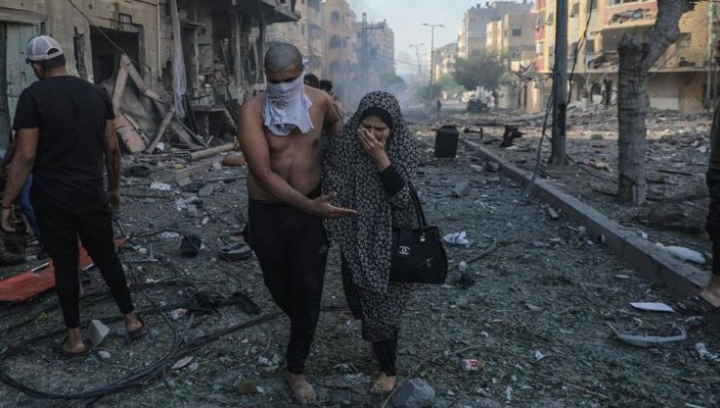Israel strikes Gaza, Syria and West Bank as war against Hamas threatens to ignite other fronts

RAFAH, Gaza Strip (AP) — Israeli warplanes struck targets across Gaza overnight and into Sunday, as well as two airports in Syria and a mosque in the occupied West Bank allegedly used by militants, as the two-week-old war with Hamas threatened to spiral into a broader conflict.
RAFAH, Gaza Strip (AP) — Israeli warplanes struck targets across Gaza overnight and into Sunday, as well as two airports in Syria and a mosque in the occupied West Bank allegedly used by militants, as the two-week-old war with Hamas threatened to spiral into a broader conflict.
Israel has traded fire with Lebanon’s Hezbollah militant group on a near-daily basis since the war began, and tensions are soaring in the Israeli-occupied West Bank, where Israeli forces have battled militants in refugee camps and carried out two airstrikes in recent days.
For days, Israel has seemed to be on the verge of launching a ground offensive in Gaza as part of its response to Hamas’ deadly Oct. 7 rampage. Tanks and tens of thousands of troops have massed at the border, and Israeli leaders have spoken of an undefined next stage in operations. But the military acknowledges there are still hundreds of thousands of Palestinian civilians in northern Gaza despite a sweeping evacuation order, which would complicate any ground attack. And the risk of triggering a broader war with Hamas’ allies in Lebanon and Syria might also give them pause. On Saturday, 20 trucks of aid were allowed to enter Gaza from Egypt through the Rafah crossing, the first time anything has gone into the territory since Israel imposed a complete siege two weeks ago.
Aid workers said it was far too little to address the spiraling humanitarian crisis in Gaza, where half the territory’s 2.3 million people have fled their homes. The U.N. humanitarian agency, known as OCHA, said the convoy carried about 4% of an average day’s imports before the war and “a fraction of what is needed after 13 days of complete siege.”
The Israeli military said the humanitarian situation was “under control” as OCHA called for 100 trucks a day to enter Hospitals packed with patients and displaced people are running low on medical supplies and fuel for generators, forcing doctors to perform surgeries with sewing needles, using kitchen vinegar as disinfectant, and without anesthesia.
The World Health Organization says at least 130 premature babies are at “grave risk” because of a shortage of generator fuel. It said seven hospitals in northern Gaza have been forces to shut down due to damage from strikes, lack of power and supplies, or Israeli evacuation orders. Shortages in critical supplies, including ventilators, are forcing doctors to ration treatment, said Dr. Mohammed Qandeel, who works in Khan Younis’ Nasser Hospital. Dozens of patients continue to arrive and are treated in crowded, darkened corridors, as hospitals preserve electricity for intensive care units and incubators for newborns.
“It’s heartbreaking,” Qandeel told The Associated Press. “Everyday, if we receive 10 severely injured patients we have to manage with maybe three or five ICU beds available.” Palestinians sheltering in U.N.-run schools and tent camps are running low on food and drinking dirty water. A power blackout has crippled water and sanitation systems. OCHA said cases of chicken pox, scabies and diarrhea are on the rise because of the lack of clean water.
Airstrikes were reported across Gaza, including in the southern part of the coastal strip, where Israel has told hundreds of thousands to seek refuge. Israel’s military has said it is striking Hamas members and installations, but does not target civilians. Palestinian militants have fired over 7,000 rockets at Israel, according to the military, and Hamas says it targeted Tel Aviv early Sunday.
Israeli Prime Minister Benjamin Netanyahu convened his Cabinet late Saturday to discuss the expected ground invasion, Israeli media reported. A military spokesman, Rear Adm. Daniel Hagari, said Israel planned to step up airstrikes starting Saturday as preparation for the “next stages of the war.” An Israeli ground assault would likely lead to a dramatic escalation in casualties on both sides. More than 1,400 people in Israel have been killed in the war — mostly civilians slain during the initial Hamas attack. At least 212 people were captured and dragged back to Gaza, including men, women, children and older adults. Two Americans were released on Friday in what Hamas said was a humanitarian gesture. More than 4,300 people have been killed in Gaza, according to the Hamas-run Health Ministry. That includes the disputed toll from a hospital explosion.
Syrian state media meanwhile reported that Israeli airstrikes have targeted the international airports in the capital, Damascus, and the northern city of Aleppo. It said the strikes killed one person and damaged the runways, putting them out of service.
Israel has carried out several strikes in Syria, including on the airports, since the war began. Israel rarely acknowledges individual strikes, but says it acts to prevent Hezbollah and other militant groups from bringing in arms from their patron, Iran, which also supports Hamas.
In Lebanon, Hezbollah said six of its fighters were killed Saturday, and the group’s deputy leader, Sheikh Naim Kassem, warned that Israel would pay a high price if it starts a ground offensive in the Gaza Strip. Israel struck Hezbollah targets early Sunday in response to rocket fire, the military said.